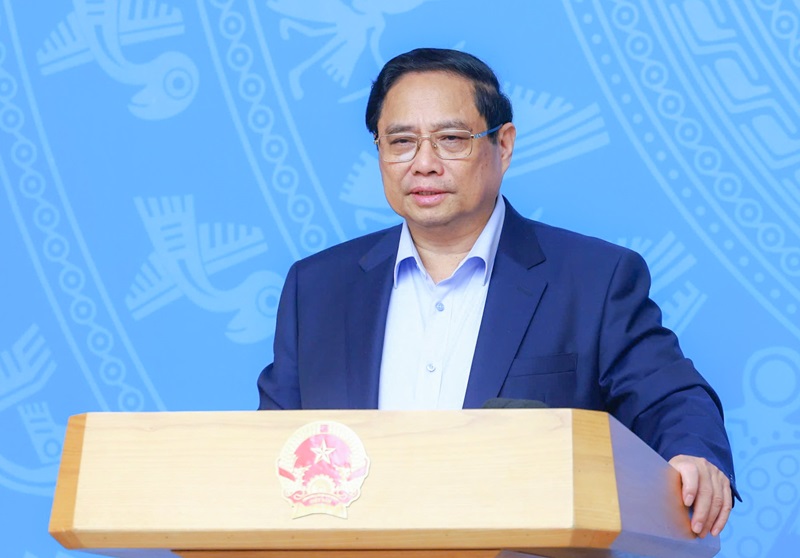Tuesday, 03/03/2026 | 22:57 GMT+7
At the meeting, held at the Government headquarters in Hanoi, the Prime Minister underscored that while progress has been made, more aggressive steps are necessary to meet Vietnam’s emission reduction targets. The country, which has already integrated its international climate commitments into national laws and policies, has seen positive developments in renewable energy projects and other green initiatives. However, given the increasing complexity of climate change, there is a pressing need for further acceleration in implementing these commitments.

Prime Minister Pham Minh Chinh presiding over the 5th meeting of the National Steering Committee on the implementation of Vietnam's commitments at COP26.
Prime Minister Pham Minh Chinh highlighted that green conversion, digital transformation, and energy transition are irreversible global trends. To effectively combat climate change and achieve net-zero emissions by 2050, Vietnam must mobilize all available resources, including domestic and international funding. The government has called for stronger public-private partnerships and increased international cooperation to facilitate technology transfer and develop a skilled workforce for green initiatives.
Following the COP26 summit, Vietnam has been proactive in its climate efforts. Significant progress has been made, including the approval of strategies on national hydrogen energy development, national energy development, and the 8th National Power Development Plan. Additionally, the country has implemented the Glasgow Declaration on Forests and Land Use and the Just Energy Transition Partnership (JETP), further aligning its national climate actions with global objectives.
On October 1, 2024, the Prime Minister signed Decision No. 1066/QD-TTg, appointing Minister of Natural Resources and Environment Do Duc Duy as the Head of the Secretariat for the Political Declaration on the Establishment of the Just Energy Transition Partnership (JETP). The Ministry plays a crucial role as the permanent body of the Secretariat, coordinating the implementation of JETP commitments between Vietnam and international partners. The Ministry is also responsible for mobilizing resources, monitoring financial and technical support, and ensuring that the goals of sustainable energy transition are met. Through these efforts, the Ministry aims to ensure Vietnam's alignment with global energy transition objectives while addressing the country's specific development needs.

The Prime Minister urging the Steering Committee members to focus on evaluating the progress of Vietnam’s commitments at COP26.
The Prime Minister stressed the importance of improving the legal framework to attract foreign investment and technological expertise. Recent government decrees have introduced mechanisms for direct power purchase agreements and encouraged the development of renewable energy projects, such as rooftop solar power. The National Energy Strategy and National Automobile Strategy have also been approved, which will contribute to reducing greenhouse gas emissions and enhancing energy efficiency.
Vietnam has also taken steps to enhance transparency and accountability in its emission reduction efforts. The Prime Minister has approved a list of key national energy programs and projects, along with a registry of industrial establishments required to conduct emission inventories. These measures aim to ensure that emission reductions are accurately tracked and that all sectors contribute to achieving Vietnam’s climate goals.
Vietnam has been working closely with international partners to enhance its climate resilience. At the COP28 conference, Vietnam introduced a comprehensive plan to mobilize resources for JETP, which includes 37 investment projects under existing programs and an additional 181 proposed projects seeking international funding. Collaboration with Japan has also been a focal point, with both countries establishing working groups to promote the Asia Zero Emission Community (AZEC) and advance green projects under the AZEC-Green Transition Platform.
Furthermore, the government has worked with global financial institutions and partners such as the Glasgow Financial Alliance for Net Zero (GFANZ) to develop innovative financial mechanisms for green energy projects. These efforts aim to support Vietnam’s transition to low-carbon energy and reduce its reliance on fossil fuels.
On the domestic front, provinces and cities across Vietnam are actively implementing measures to reduce greenhouse gas emissions. Local governments are encouraging businesses to conduct emission inventories, develop waste-to-energy plants, and adopt energy-efficient public lighting systems. Some major cities have introduced electric buses and public bike-sharing programs, while others are engaging in forest carbon trading programs to enhance their environmental sustainability.
Prime Minister Pham Minh Chinh concluded the meeting by calling for higher determination and greater efforts across all sectors of society to fulfill Vietnam’s climate commitments. With international cooperation, legal reforms, and active participation from local communities, Vietnam is on a path to achieving its climate goals and contributing to global efforts to mitigate climate change.
This renewed determination, backed by comprehensive strategies and international partnerships, reinforces Vietnam’s role as a key player in the global fight against climate change.
According to Natural Resources and Environment E-magazine







